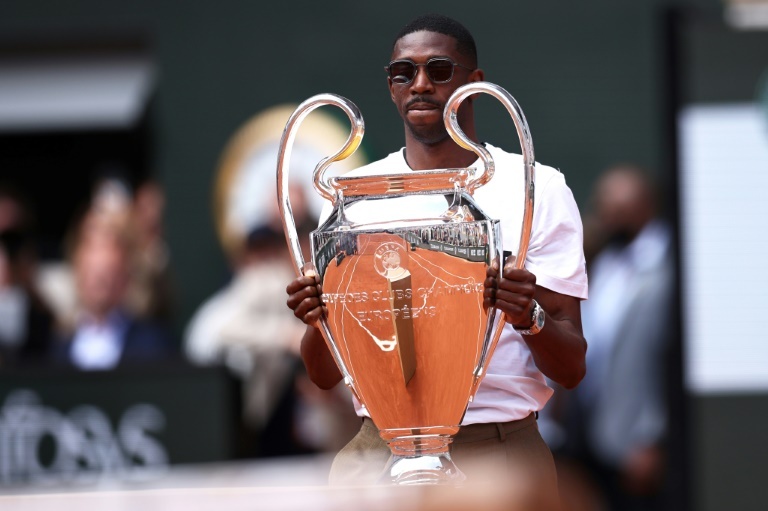Yamal vs Dembele: A golden duel on the road to the Ballon d'Or


"If I had to give the Ballon d'Or to someone..." has become a popular phrase in recent days, with most debates narrowing down to two names: Lamine Yamal and Ousmane Dembele.
Players, coaches, journalists, and other prominent football voices have all weighed in, and while contenders like Raphinha and Pedri have strong cases, it's these two who dominate the conversation. And Kylian Mbappe isn't out of the race yet, with the Club World Cup still to come.
This could be one of the most divided years in memory when it comes to the award, but no winner will be announced until 22 September. There's still the end of spring and all of summer to shape opinions, and every direct encounter between candidates becomes a golden opportunity to impress.
Wednesday's Spain vs France semi-final in Stuttgart could offer just that. Raphinha might be the most productive player statistically in Europe this season, with a staggering 56 goal contributions, but the spotlight has shifted firmly onto Lamine Yamal.
The 17-year-old has dazzled in the final stretch of the season, dragging Barcelona forward with key goals and moments at critical junctures under Hansi Flick. What he's achieved at his age is nothing short of astonishing.
Dembele, meanwhile, had a quieter start to the season but exploded into form in 2025. As a free agent in PSG's fluid system, he flourished. For months, he led the scoring charts among players in Europe's top five leagues, only overtaken late on by Mbappe, who secured the Golden Shoe.
The Frenchman now has 29 goals this calendar year; Dembele follows closely with 26. Two assists in PSG's Champions League final win over Inter added a perfect finishing touch.
A treble-winning season, coupled with 33 goals and 14 assists in 49 PSG appearances—and two more goals with France—puts the man from Vernon in a strong position for the Ballon d'Or.
The Nations League could give him another major push. In total, Dembele has contributed to 49 goals this season, looking like a different player under Luis Enrique. Yet, if he hadn't left Barcelona, Lamine Yamal might never have had the same chances.
And that's where the Rocafonda-born youngster shines. He introduced himself to the world with a screamer against France in last summer's Euros—a sign of his fearless personality. This season, he's established himself as a direct contributor in front of the goal, with 18 goals and 21 assists.
That's 39 for Barcelona, or 41 if you count one goal and one assist with the Spanish national team. He's also claimed the La Liga, Copa del Rey and Spanish Super Cup titles.

Advanced stats from BeSoccer Pro provide further insight. As expected, Dembele leads in the box: his shooting accuracy is 37.21%, compared to Yamal's 20.45%, and he averages 2.22 shots on target per 90 minutes (vs. 1.61). He tops the charts for shots on target in the big five leagues—above even Mbappe.
A key part of Dembele's evolution has been his shift into a false nine role, abandoning the wings to play centrally, where he opened up spaces for Doue, Kvaratskhelia and Barcola. He also saw more of the ball in those areas—6.71 touches in the box per 90 minutes to Yamal's 5.15.
But when it comes to dribbling, few can match Lamine Yamal. He was the second-best dribbler in Europe's top leagues, behind only Jeremy Doku, and ahead of Bryan Zaragoza, Bynoe-Gittens, Vinicius Jr—and Dembele, who averaged 4.05 successful dribbles per 90 minutes, compared to Yamal's 6.37.

Yamal also edged Dembele in dribble accuracy (56.11% vs. 55.09%) but lost the ball more often (13.66 vs. 12.76 per 90 minutes).
Though the Spaniard provided more direct assists and pre-assists, Dembele made more passes overall (37.29 vs. 32.51), at greater accuracy (79.3% vs. 77.07%), and more of them were progressive—4.26 per 90 into the final third and 3 into the box, compared to Yamal's 2.15 and 2.98.
Defensively, Yamal's commitment under Flick's pressing system has been evident. He bettered Dembele in nearly every metric: more offensive duels won (8.67 vs. 5.01), more defensive duels won (2.32 vs. 1.08), more quick recoveries after losing possession (1.72 vs. 1.24), and more ball recoveries in the opponent's half (2.12 vs. 1.45) and final third (0.62 vs. 0.44).
In the end, both are statistically balanced, whether in basic or advanced metrics. It may all come down to the Champions League, the Nations League, or the Club World Cup. And let's not forget—this year's list of contenders is wider than usual.
The final chapters are yet to be written. What happens on Wednesday in Stuttgart might just tip the balance come September, when the curtain rises at the Theatre du Chatelet in Paris.








